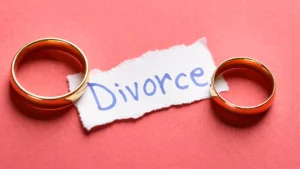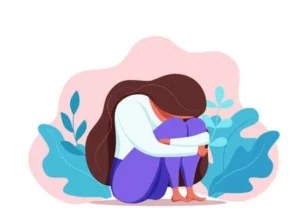When a couple divorces, it can be a traumatic experience for both parties involved. In some cases, the trauma can be so great that it leads to Post-Traumatic Stress Disorder (PTSD). This is a condition that is often associated with military veterans who have experienced combat, but it can also occur in people who have gone through a divorce. If you are experiencing symptoms of PTSD following your divorce, it is important to seek help from a therapist or counselor. There are many treatments available that can help you recover from this devastating disorder.
Contents
Defining PTSD From Divorce
 PTSD, a popular acronym for post-traumatic stress disorder, is a psychiatric disorder that can occur after experiencing or witnessing a traumatic event. According to the American Psychiatric Association’s Diagnostic and Statistical Manual of Mental Disorders, Fifth Edition (DSM-V), a diagnosis of PTSD requires exposure to “death, threatened death, actual or threatened serious injury, or actual or threatened sexual violence.” The exposure must result in a “response involving intense fear, helplessness, or horror.”
PTSD, a popular acronym for post-traumatic stress disorder, is a psychiatric disorder that can occur after experiencing or witnessing a traumatic event. According to the American Psychiatric Association’s Diagnostic and Statistical Manual of Mental Disorders, Fifth Edition (DSM-V), a diagnosis of PTSD requires exposure to “death, threatened death, actual or threatened serious injury, or actual or threatened sexual violence.” The exposure must result in a “response involving intense fear, helplessness, or horror.”
Divorce is no less traumatic than other potentially PTSD-inducing events. The DSM-V notes that people who experience “repeated or extreme exposure to aversive details of the event” are at an increased risk for developing PTSD. This would certainly apply to anyone going through a divorce, which is often long and drawn out, with both parties reliving the pain of the breakup over and over again. It also brings forth a lot of other difficult emotions, such as anger, guilt, and sadness.
While these emotions may seem normal for someone separating from their partner, they can become all-consuming and cause serious problems in a person’s life if they develop PTSD.
Divorce may not seem as threatening and violent as some of the other events that can lead to PTSD, but it can be just as devastating. If you are struggling to cope with the aftermath of your divorce, it is important to seek professional help. There are many treatment options available that can help you heal from this traumatic experience.
Factors Responsible
 Divorce in itself is a big life event and can be very stressful. The loss of a relationship, the feeling of betrayal, and the sense of failure can all contribute to stress and anxiety. In addition to this emotional turmoil, there are other factors that can make divorce even more stressful and increase the risk of developing PTSD.
Divorce in itself is a big life event and can be very stressful. The loss of a relationship, the feeling of betrayal, and the sense of failure can all contribute to stress and anxiety. In addition to this emotional turmoil, there are other factors that can make divorce even more stressful and increase the risk of developing PTSD.
- One of these factors is the type of divorce. A divorce that is acrimonious, or one in which the couple cannot agree on anything, is more likely to lead to PTSD than a divorce that is amicable. This is because an acrimonious divorce is often full of conflict and can be very protracted.
- Another factor that can contribute to the development of PTSD is a divorce that is sudden and unexpected. If one partner blindsides the other with a divorce, it can be a shock that can lead to PTSD. This is because the person who did not see the divorce coming often feels a sense of betrayal and abandonment.
- In instances where couples are separating because of infidelity, the person who was cheated on may also be at an increased risk for developing PTSD. This is because they may feel a sense of betrayal, shame, and anger.
- It is also important to note that PTSD can develop even if you are the one who initiated the divorce. This is because divorce is still a loss, and you may experience feelings of grief and sadness.
- In cases where a couple has children, the divorce can be even more stressful. This is because not only are the parents dealing with the loss of their relationship, but they also have to worry about the welfare of their children. This can be a very anxiety-producing situation.
- In some unfortunate instances, divorce can get messy, ugly and abusive. This is obviously the most stressful type of divorce and can lead to PTSD. If you are in an abusive situation, the process of separation can be very dangerous.
- Managing finances and logistics can also be a major source of stress during and after a divorce. This is because couples often have to deal with property division, child custody, and support payments.
- This is a hard truth to face, but many people’s families and friends take sides during a divorce. This can add to the stress and isolation that a person feels during this difficult time.
- Lastly, the legal and formal aspects of divorce can also be very stressful. This is because the divorce process can be long and complicated, and it often requires dealing with lawyers and the court system. All of these factors can contribute to stress and anxiety, which can lead to PTSD.
There are some of the many factors that can contribute to the development of PTSD following a divorce. All of these things can be very complicated and can cause a lot of stress. It is important to remember that everyone reacts to divorce differently. Some people may have a very difficult time coping with the aftermath, while others may be able to move on relatively easily.
If you are struggling to cope with your divorce, it is important to seek professional help. There are many treatment options available that can help you heal from this traumatic experience.
Signs And Symptoms
There are a number of symptoms that people with PTSD may experience. Typically, signs of PTSD are divided into 4 categories. These are as follows.
- Avoidance – People with PTSD often try to avoid anything that reminds them of the trauma they experienced. This may mean avoiding people, places, activities, or anything else that brings back memories of the divorce.
- Negative changes in mood and thinking – PTSD can cause a person to feel depressed, anxious, or angry. They may also have negative thoughts about themselves or others. For example, they may believe that they are not good enough or that everyone is out to get them.
- Changes in physical and emotional reactions – People with PTSD may startle easily, have trouble sleeping, or feel tense and on edge. They may also have problems concentrating or feeling affectionate. Moreover, their memories of the divorce may be so vivid and distressing that they feel like they are going through it all over again.
- Flashbacks or intrusive thoughts – People with PTSD may relive the trauma over and over again in their minds. This can happen in the form of flashbacks, nightmares, or intrusive thoughts. This can manifest itself in different ways for different people. Some may see images of the divorce, while others may hear voices or have physical sensations.
These experiences can be so distressing that they avoid anything that may trigger them. If you are experiencing any of these symptoms, it is important to seek professional help. PTSD can be a very debilitating disorder, but there are treatments that can help you manage your symptoms and live a normal life.
Consequences
 It is no secret that going through a major life transition, such as divorce, can be very stressful. However, for some people, the stress of divorce can lead to serious mental health problems, such as PTSD. PTSD can have a number of negative consequences on a person’s life. For example, people with PTSD may have difficulty maintaining relationships, both personal and professional. They may also have problems with work, school, and other activities.
It is no secret that going through a major life transition, such as divorce, can be very stressful. However, for some people, the stress of divorce can lead to serious mental health problems, such as PTSD. PTSD can have a number of negative consequences on a person’s life. For example, people with PTSD may have difficulty maintaining relationships, both personal and professional. They may also have problems with work, school, and other activities.
Emotional disbalance can also cause physical reactions such as:
- Insomnia
- Loss of appetite
- Fatigue
- Headaches
- Muscle tension or pain
- Upset stomach
- Problems with sexual intimacy
All of these things can make it difficult for a person to function in their everyday life. Moreover, severe PTSD is a gateway to a variety of psychological and emotional issues such as:
- Anxiety
- Depression
- People pleasing tendencies
- Isolation/withdrawal
- Agoraphobia
- Fear of abandonment
- Intimacy issues
- Eating disorders
- Obsessive-compulsive disorder
- Substance abuse
- Self-harm
- Suicidal thoughts or behaviors
If you are struggling to cope with your divorce, it is important to seek professional help. There are many treatment options available that can help you heal from this traumatic experience.
Ways To Deal
Fortunately, even these difficult times will end. Here are some ways that you can start to deal with your PTSD and begin to heal.
Stay in touch with your lawyer
 Along with the emotional baggage, divorce also accompanies a lot of legalities. It is crucial that you stay in touch with your lawyer so you are up-to-date on the latest happenings. This way, you can be sure that everything is being taken care of and you can focus on your healing.
Along with the emotional baggage, divorce also accompanies a lot of legalities. It is crucial that you stay in touch with your lawyer so you are up-to-date on the latest happenings. This way, you can be sure that everything is being taken care of and you can focus on your healing.
Get organized
One way to help you feel in control is to get organized. This can be helpful in different aspects of your life. For example, if you have joint custody of your children, create a schedule that works for everyone involved. If you are dealing with financial issues, make a budget and stick to it. Having a plan can help reduce stress and give you a sense of control.
Talk about your experiences
It is important to talk about what you are going through with someone who will understand and be supportive. This may be a friend, family member, therapist, or support group. Talking about your experiences can help you to process them and start to make sense of what happened.
Avoid unhealthy coping mechanisms
When we are emotionally in a dark place, it is easy to fall into unhealthy coping mechanisms, such as drinking, using drugs, or engaging in risky behaviors. These things may provide temporary relief from your pain, but they will only make your problems worse in the long run. If you find yourself turning to unhealthy coping mechanisms, it is important to seek professional help.
Focus on taking care of yourself
 During this difficult time, it is important to focus on taking care of yourself. This means eating a healthy diet, getting enough sleep, and exercising regularly. Taking care of yourself will help you to feel better physically and emotionally. There are various ways and methods of relaxation and self-care. Trying to find a balance in your life is important. However, it is okay to give yourself some time to grieve and heal.
During this difficult time, it is important to focus on taking care of yourself. This means eating a healthy diet, getting enough sleep, and exercising regularly. Taking care of yourself will help you to feel better physically and emotionally. There are various ways and methods of relaxation and self-care. Trying to find a balance in your life is important. However, it is okay to give yourself some time to grieve and heal.
Losing your significant other is bound to make you feel lonely, but it is important to form social support. This may mean joining a support group, spending time with friends and family, or volunteering. Getting involved in activities and spending time with people who care about you can help you to feel better. It can also be a chance for you to get into new hobbies or interests, and also meet new people.
Practice self-love
When your partner is no longer in your life, it is easy to feel like you are not good enough. However, it is important to remember that you are worthy of love and respect. Practicing self-love can help you to feel better about yourself and also help you to heal from the pain of your divorce. There are many ways to practice self-love, such as:
- writing down your positive qualities
- spending time outdoors
- saying positive affirmations
- organizing quality alone time
- taking up new hobbies
- practicing meditation or yoga
- eating healthy foods
These are obviously only a few ideas, but hopefully, they give you a starting point. Remember that everyone heals differently and there is no right or wrong way to do it. The main purpose is to focus on taking care of yourself and moving forward.
Seek professional help
 At last, it is absolutely essential to seek professional help if you are struggling to cope with your divorce. A therapist can provide you with support and guidance as you deal with your PTSD. They can also help you to develop healthy coping mechanisms and work through your trauma. If you are having difficulty functioning in your day-to-day life, it is important to seek professional help. In severe cases, they may also prescribe medication. It is very important to get the help that you need in order to heal.
At last, it is absolutely essential to seek professional help if you are struggling to cope with your divorce. A therapist can provide you with support and guidance as you deal with your PTSD. They can also help you to develop healthy coping mechanisms and work through your trauma. If you are having difficulty functioning in your day-to-day life, it is important to seek professional help. In severe cases, they may also prescribe medication. It is very important to get the help that you need in order to heal.
These are just a few ways to manage divorce syndrome or PTSD from the breakup of a marriage. If you’re experiencing emotional or legal difficulties after your divorce, don’t hesitate to seek professional help. If you’re feeling lost and alone after your divorce, it’s important to reach out for support. You may also want to consider joining a divorce support group, where you can share your experiences with others who understand what you’re going through. Finally, don’t forget to take care of yourself emotionally and physically during this difficult time.
Conclusion
Conclusively, we can determine that PTSD from divorce is a very real and serious issue. If you or someone you know is struggling to cope with the aftermath of a divorce, don’t hesitate to seek professional help. There are many resources available to help you heal and move on with your life. Remember to take care of yourself during this difficult time.
If you or someone you know is looking for psychological help, Therapy Mantra is here for you. We are the leading providers of online therapy and counseling. Our team of highly trained and experienced therapists can provide assistance at the most affordable rates. Contact us today to learn more about our services. You may also visit our website to book an online therapy session or download our free Android or iOS app for more information.


